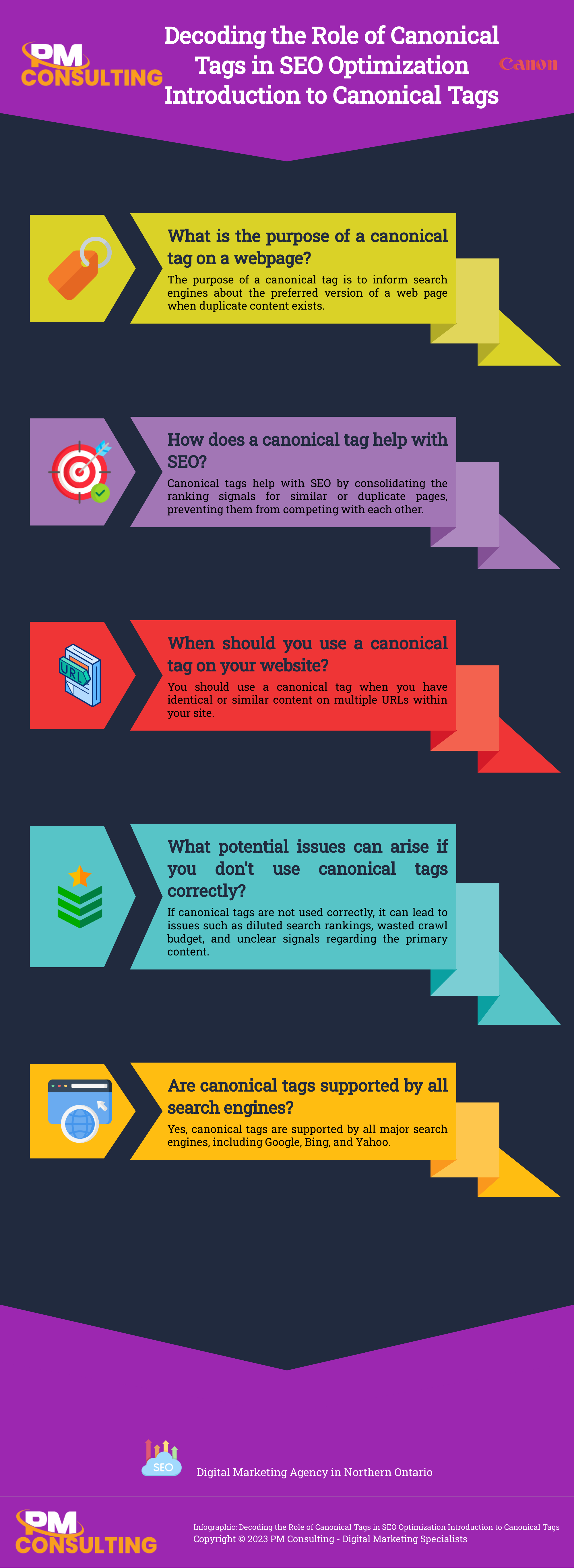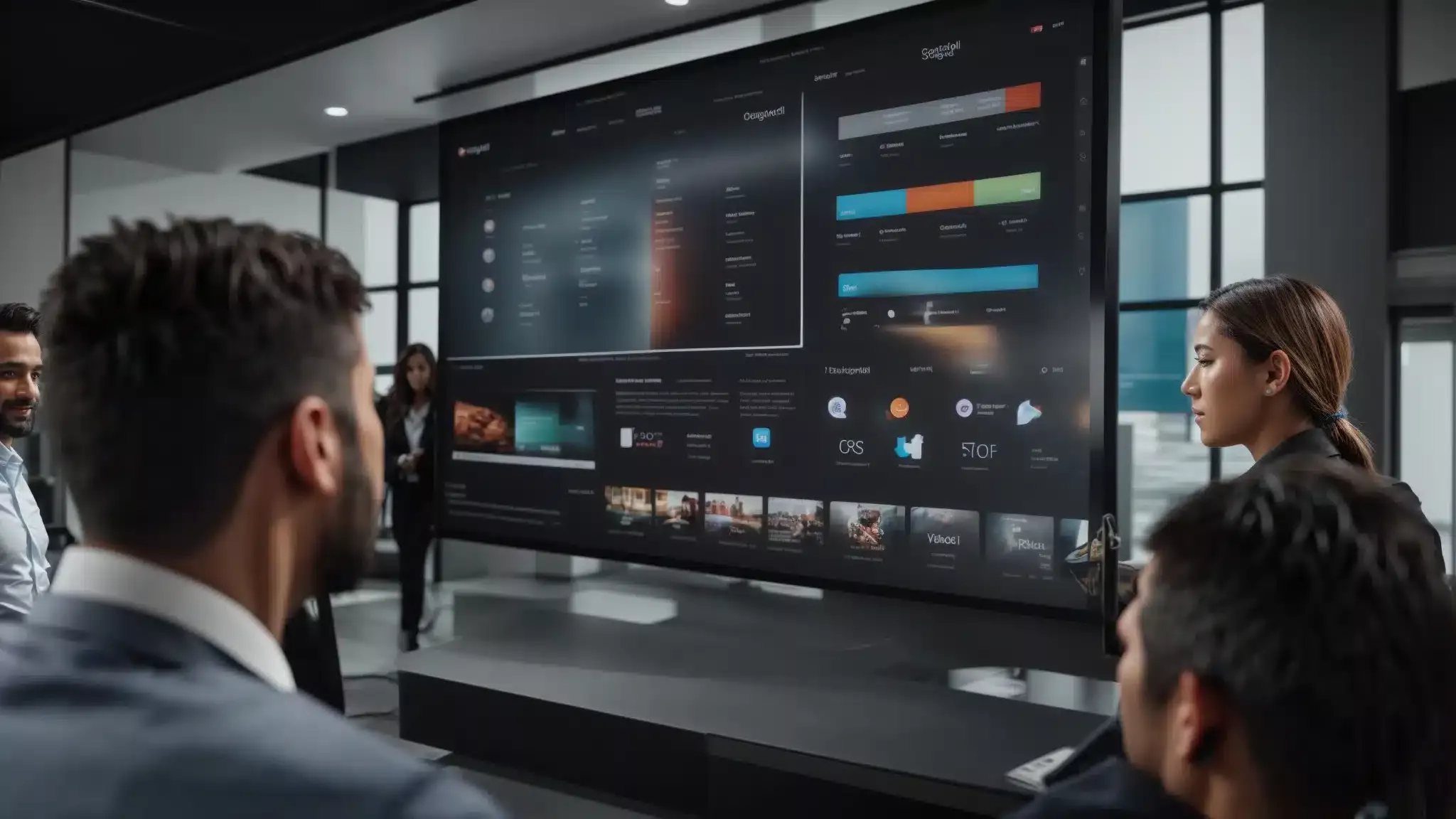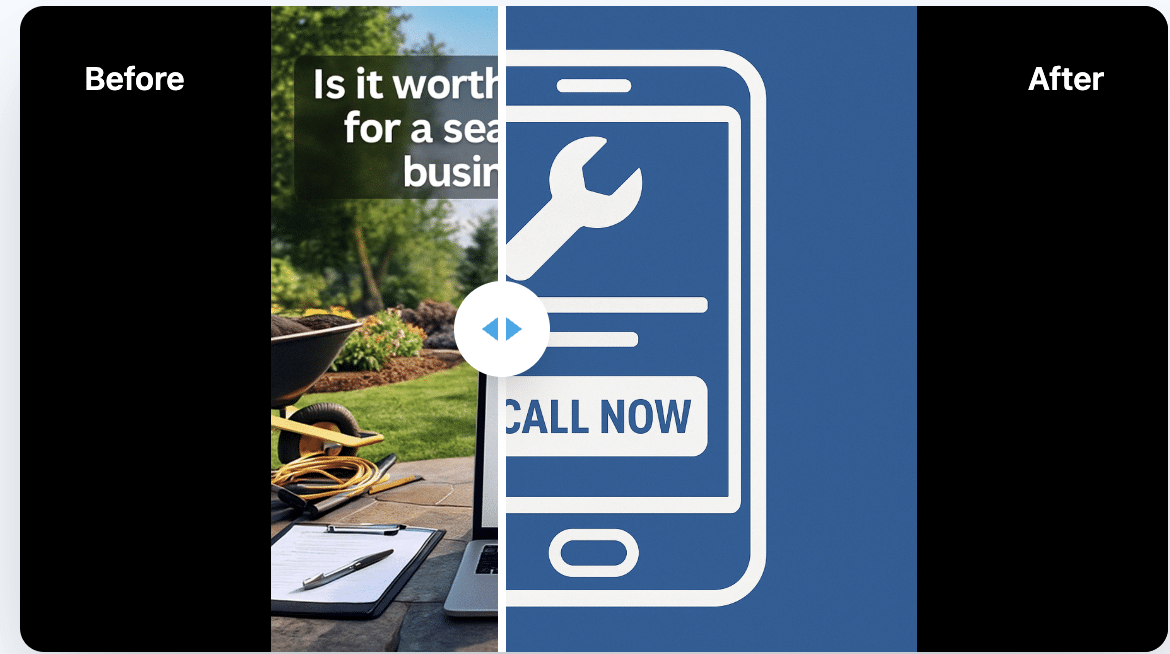Maximize SEO: The Power of Canonical Tags Explained
Decoding the Role of Canonical Tags in SEO Optimization. Navigating the maze of SEO best practices can often lead one to the powerful yet underutilized tool known as canonical tags.
A fundamental grasp of these HTML elements is crucial for digital marketers aiming to avoid the pitfalls of duplicate content and maintain the integrity of their search rankings.
PM Consulting specializes in leveraging such SEO strategies, ensuring that every link on your website serves a purpose and contributes to your overall online presence.
With the right implementation of canonical tags, you stand to bolster your site’s relevance and authority.
Keep reading to unlock the full potential of canonical tags with PM Consulting’s expert insights.

Introduction to Canonical Tags
Understanding the importance of technical SEO strategies in optimizing a website’s performance and visibility in search engine results. One such strategy is the implementation of canonical tags, which play a crucial role in managing duplicate content and preserving a website’s organic search rankings.
Canonical tags are HTML elements that are inserted into the head section of a webpage’s code. They serve as a directive to search engines, indicating the preferred version of a webpage when multiple versions exist with similar or identical content. The purpose of a canonical tag is to consolidate multiple URLs with the same content into a single, canonical URL, which is then seen as the authoritative version by search engines in terms of search engine indexing.
By using canonical tags, website owners can avoid dilution of their search rankings and prevent any negative effects that duplicate content may have on their website’s SEO efforts. When different versions of a webpage exist, such as multiple URLs, parameter variations, or different pagination pages, the canonical tag guides search engines to index and attribute all ranking value to the preferred version. This ensures that the desired page is correctly ranked and avoids any confusion or penalties that could arise from duplicated content.
Implementing canonical tags requires a thorough understanding of a website’s URL structure, content management system, and the specific pages that need to be specified as canonical URLs. It is vital to review and audit a website’s duplicate content issues to identify the appropriate pages for the canonical tags. Additionally, ongoing monitoring of website changes, new content creation, and user-generated content is necessary to maintain the integrity of the canonical tags and prevent any future duplicate content issues. The use of the canonical link element is crucial for effective search engine indexing and search engine optimization.
Canonical tags are an essential tool for website owners and SEO professionals to manage duplicate content effectively and maintain search engine rankings. By implementing canonical tags correctly, websites can consolidate their content and ensure that search engines understand the preferred version of a webpage. This not only helps to preserve organic search rankings but also provides a better user experience by ensuring that users are directed to the most relevant and authoritative version of a webpage.
The Importance of Canonical Tags in SEO
As a professional in the field of SEO, I understand the significance of canonical tags and their impact on website optimization. Canonical tags, also known as rel=canonical tags, play a crucial role in ensuring that search engines properly index and rank web pages. These tags are essentially a signal to search engines, indicating the preferred version of a particular webpage when there are multiple versions available.
One of the main reasons canonical tags are important in SEO is the issue of duplicate content. Search engines penalize websites that have identical or very similar content across multiple pages, as it can create confusion and dilute the overall ranking potential. By implementing canonical tags, website owners can indicate the original, or preferred, version of a page, thereby consolidating the ranking signals and avoiding any negative effects caused by duplicate content. Additionally, it helps with search engine optimization by improving search engine indexing and canonicalization.
Canonical tags also contribute to better search engine indexing and crawl budget management. When search engines crawl a website, they allocate a certain budget for each site, determining how many pages they will crawl during each visit. Without canonical tags, search engines may end up wasting their crawl budget by indexing multiple versions of the same content. By providing clear directives with canonical tags, website owners can guide search engines to focus on crawling and indexing the most important and relevant pages, which can positively impact the overall visibility and ranking of the site.
Canonical tags are an essential tool in SEO that help optimize websites for search engines. By properly implementing and utilizing these tags, website owners can effectively manage duplicate content, avoid penalties, and improve their overall search engine ranking. As a professional, I highly recommend incorporating canonical tags into your SEO strategy to enhance the visibility and performance of your website.

How Canonical Tags Influence Search Engine Rankings
Understanding the importance of canonical tags in influencing search engine rankings. Canonical tags play a crucial role in organizing and optimizing website content for search engines like Google. These tags essentially inform search engines about the preferred URL for search engine indexing and ranking a particular web page.
When search engines encounter duplicate content across multiple URLs, they may face difficulty in determining which version to rank or index. This can lead to fragmented rankings and dilution of SEO efforts. However, by implementing canonical tags, website owners can indicate the primary or preferred URL to search engines, ensuring that the desired page is indexed and ranked appropriately.
Canonical tags help consolidate duplicate content variations to a single, canonical version. By doing so, they consolidate the ranking signals and relevancy indicators associated with the different versions, leading to more accurate rankings. Search engines recognize the canonical tags and attribute the ranking value to the preferred URL specified, enhancing the visibility and ranking potential of the intended page.
In summary, canonical tags are an essential optimization technique used by professionals in the field to influence search engine rankings. By addressing duplicate content concerns and signaling the preferred version, these tags streamline rankings and prevent dilution of SEO efforts. By implementing canonical tags effectively, website owners can achieve better organic visibility and improve their overall search engine rankings.
Best Practices for Implementing Canonical Tags
Canonical tags are HTML elements that inform search engines about the preferred version of a webpage when multiple versions with similar content exist. By using canonical tags, website owners can consolidate link equity and avoid duplicate content issues.
To implement canonical tags effectively, there are a few best practices to keep in mind. Firstly, it is crucial to identify the main version of a webpage and determine which other URLs have similar content. This may be necessary when different URL variations can lead to the same content, such as when parameters or tracking codes are added to the URL. Canonicalization is an important aspect of search engine indexing and search engine optimization.
Once the main version is identified, the canonical tag should be placed in the head section of the webpage’s HTML code. It should contain the preferred URL as its attribute value. This indicates to search engines that the specified URL is the primary version and should be given priority in search engine indexing and ranking.
Furthermore, it is important to ensure that the canonical tags are correctly implemented across all similar URLs. Regular monitoring and periodic audits of the website can help identify any missing or incorrect implementations, which can then be remedied promptly. Search engine indexing is crucial for effective search engine optimization.
By following these best practices, website owners can effectively implement canonical tags and avoid the negative impact of duplicate content on their search engine rankings. This can lead to improved visibility, greater user satisfaction, and ultimately, increased organic traffic to their websites.
Key Takeaways
- Proper Use of Canonical Tags Is Vital for Steering Search Engines to the Preferred URL and Improving SEO Rankings
- Duplicate Content Can Split Page Ranking and Dilute SEO Efforts, Which Canonicals Help to Prevent by Consolidating Link Signals
- PM Consulting Conducts Regular Audits to Ensure Canonical Tags Are Correctly Implemented and Reflect Any Changes in Website Content or Structure
- Technical SEO Involves Rigorous Site Audits and Consistent Application of Canonical Tags to Avoid Sending Mixed Signals to Search Engines
- Harmonizing SEO Strategies Across All Digital Platforms, Including Social Media, Strengthens a Brand’s Online Presence and Discoverability
Understanding the Basics of Canonical Tags

In the intricate arena of search engine optimization, PM Consulting recognizes the significance of clarity and effectiveness when it comes to digital strategy.
One pivotal aspect often overlooked is the role of canonical tags, which are essential for websites to signal their preferred URLs to search engines.
Canonical tags serve as beacons, guiding search engines to the original content and avoiding the convoluted pathways that duplicate content issues can present.
Their proper usage is instrumental in maintaining a clean and efficient SEO profile for any website.
What Are Canonical Tags and How Do They Work
At its core, a canonical tag, also known as a “rel canonical,” acts as a clear directive for search engines to understand the master copy of a page. PM Consulting leverages this tool to ensure that search engines index the version of a URL they deem most valuable, thus boosting a site’s visibility and SEO ranking.
Functioning as a silent navigator, canonical tags carefully instruct search engines on which URL to prioritize when multiple versions of a page are present. It’s a strategic approach adopted by PM Consulting to reinforce the authority of a chosen URL, thus helping clients avoid the split in page ranking that can occur with duplicate content.
The Role of Canonical Tags in Preventing Duplicate Content Issues
Duplicate content issues can swiftly derail a website’s SEO progress, causing confusion among search engines and diluting ranking power. By implementing canonical tags, PM Consulting addresses this challenge head-on, marking the preferred URL as the source of original content and informing search engines to attribute all related SEO merit to this master version.
This strategic application of Canonical Tags Simplifies the Search Engine’s Task: instead of sifting through similar content to determine the most relevant page, the tag directs them to the original, effectively preventing the negative impacts of duplicated content on a site’s SEO standing:
- Consolidates link signals for similar or duplicate pages to the preferred URL,
- Prevents the split of ranking power caused by duplicate content,
- Enhances the user experience by guiding visitors to the authoritative page.
PM Consulting’s Meticulous Use of canonical tags ensures that clients’ websites are clearly communicating with search engines, establishing a streamlined path to superior SEO performance.
Strategic Implementation of Canonical Links

In a digital landscape awash with content, maintaining SEO integrity can be a complex task.
PM Consulting adeptly navigates this challenge, recognizing the need for a tactical application of canonical tags to bolster a site’s SEO potential.
Identifying when to employ canonical tags is crucial, as is adherence to established best practices when setting up the correct canonical URLs.
These sophisticated techniques are part of a broader strategy to ensure that clients’ websites communicate effectively with search engines and achieve their intended search rankings.
Identifying Situations for Using Canonical Tags
Recognizing the ideal moments to apply canonical tags stands at the core of advanced SEO tactics. PM Consulting’s experts meticulously evaluate the structure and content of clients’ websites to pinpoint opportunities for canonicalization, such as instances of product pages with multiple variations or content accessible via multiple URLs.
Each situation presenting multiple versions of a single page, whether due to URL parameters, printer-friendly versions, or session IDs, necessitates the thoughtful deployment of canonical tags. These precise moments require an understanding that solidifies the principal content version for search engines:
| Scenario | Solution with Canonical Tag |
|---|---|
| Product Pages with Color/Size Variations | Set the canonical to the main product page to concentrate SEO strength. |
| Content Accessible via Multiple URLs | Canonicalize to a single preferred URL to eliminate duplication. |
Best Practices for Setting Up Correct Canonical URLs
Setting up the correct canonical URLs is a nuanced process that requires attention to detail. PM Consulting emphasizes the importance of selecting the most representative URL as the canonical target: a page that offers the most comprehensive and relevant content for the search query.
Ensuring that each canonical tag is correctly implemented across a site demands a methodical approach. It’s not just about fixing one duplicate content issue, but about crafting a cohesive map of all preferred URLs:
- Analyze the website’s content structure to determine the primary version of each page.
- Apply the canonical tag uniformly, ensuring consistency throughout the website.
- Verify the accuracy and functionality of each canonical tag to prevent errors in search engine indexing.
Moreover, PM Consulting undertakes regular audits of canonical tags and search engine indexing to account for changes in website content or structure, thereby maintaining an up-to-date SEO strategy that reflects the current state of the site.
Analyzing the Impact on SEO Rankings

Grasping the impact of canonical tags on search engine optimization is a vital component for elevating a website’s position in search rankings.
PM Consulting’s focused methods provide insight into the nuanced influence of canonical signals, guiding search engines with authoritative declarations of content primacy.
Through compelling case studies, PM Consulting has illustrated the potency of well-implemented canonicals in sharpening a site’s SEO profile, underscoring the transformational potential they hold when integrated into a comprehensive digital marketing strategy.
How Search Engines Interpret Canonical Signals
When PM Consulting examines the landscape of search engine algorithms, a crucial observation surfaces: search engines utilize canonical tags as directional signals to decipher the relationship between web pages and select the most authoritative source for display in search results. This process ensures that the value derived from links and content metrics is allocated to the specified URL designated by the canonical tag and helps with search engine indexing.
PM Consulting’s strategy involves aligning clients’ websites with search engine guidelines regarding canonicalization. Search engines, in their quest to provide users with the most relevant and high-quality results, interpret the canonical signals as a means to distinguish the master page from its duplicates. This distinction is critical for maintaining the website’s SEO foundation unshaken by the commonality of content across the internet.
- Navigation clarity is enhanced as search engines are steered towards the predominant version of content.
- SEO efforts are concentrated on a single, authoritative URL, thus amplifying the visibility of the client’s digital presence.
- It prevents the dilution of link equity amongst multiple similar pages, fortifying the preferred URL’s ranking potential.
Case Studies Demonstrating Improved SEO With Canonicals
PM Consulting illuminates the efficacy of canonical tags through real-world success stories, highlighting instances where their implementation has been a game-changer for SEO outcomes. The judicious application of canonicals has propelled websites from the depths of search engine obscurity to prominent rankings, significantly amplifying organic reach and click-through rates.
One illustrative example includes a regional e-commerce platform that struggled with multiple product listings, diluting its SEO efforts. After PM Consulting intervened, establishing precise canonical tags, the site witnessed a remarkable improvement in product page rankings, leading to an increase in user engagement and sales conversions. The use of canonicalization played a vital role in optimizing search engine indexing and improving the overall search engine optimization strategy.
Common Mistakes to Avoid With Canonization

Maintaining SEO integrity requires vigilance against common pitfalls associated with canonical tag use.
At PM Consulting, experts recognize that missteps in canonization can undermine efforts to streamline a website’s SEO profile.
The introduction of canonical tags, an HTML element, requires precise execution; even minor errors may lead to significant consequences, like incorrect search engine indexing such as indexation of the wrong version of content or dilution of keyword strength.
As PM Consulting navigates through the diagnostic and corrective phases of incorrect tagging, their focus never wavers from ensuring that websites achieve a cohesive and impactful SEO presence.
Equipped with an in-depth understanding of managing multiple content versions, the agency provides seamless solutions to enhance search engine trust and content efficacy.
Diagnosis and Resolution of Incorrect Tagging
At PM Consulting, diagnosing incorrect use of canonical tags begins with an exhaustive review of the website’s unified resource locators, also known as URLs. The team meticulously examines each URL to identify instances where canonical tags may have been misapplied or omitted.
- Initial assessment to spot canonical anomalies across the website’s pages,
- An in-depth analysis is needed to determine the repercussions of incorrect tag implementations.
- Careful rectification is necessary to align all canonical tags with the SEO objectives of the website.
Resolution is swiftly enacted to align every canonical tag with the intended master page, thereby restoring potency to the site’s SEO strategy. This meticulous correction process safeguards a site’s authoritative presence in search results, fortifying its competitive edge in the digital marketplace.
Overcoming Challenges When Managing Multiple Versions
PM Consulting’s expertise shines when addressing the complexity of handling multiple content versions within a single domain. They implement rigorous strategies to distinguish and manage similar pages, ensuring search engines index the intended primary content, which consolidates SEO strength and improves rankings.
The team at PM Consulting adeptly navigates through the nuances of web content, judiciously employing canonical tags to unite various page versions. This unity results in a seamless user experience and reinforces the website’s credibility and authority from an SEO perspective.
Integrating Social Media Platforms and Plugins

With PM Consulting’s digital acumen, integrating social media platforms and plugins becomes a sophisticated part of strengthening a brand’s SEO landscape.
Recognizing the clout of social symbols in today’s digitally driven society, PM Consulting harnesses their influence on social shares and content syndication.
The expertise extends to orchestrating SEO efforts across various channels to deliver a harmonious message that resonates with both search engines and social networks, ensuring consistent branding and optimization in the digital realm.
The Influence on Social Shares and Content Syndication
PM Consulting’s expertise recognizes the symbiotic relationship between SEO and social media engagement, particularly how canonical tags influence content syndication across platforms. By ensuring canonical tags accurately reflect the definitive version of a content piece, the agency amplifies the visibility of shared content, thereby enhancing social signals that are increasingly pivotal in SEO rankings.
Ensuring that shared content maintains link equity through the proper use of canonical tags prevents dilution of SEO efforts and preserves content integrity, even when distributed across multiple social platforms. PM Consulting’s strategic approach ensures that the original content source retains its ranking power and domain authority, fostering trust and credibility among audiences and search engines alike.
Synchronizing Your SEO Efforts Across Different Channels
PM Consulting excels in crafting a uniform SEO strategy that resonates across various digital platforms. By harmonizing the narrative on social networks with that found on the primary website, the agency ensures a cohesive online presence, reinforcing brand messages and optimizing search engine discoverability.
The team’s proficiency in coordinating search engine optimization efforts ensures a synergy between a brand’s website and its social media profiles. Through this synchronization, PM Consulting amplifies the reach and impact of their client’s digital content, leveraging cross-channel consistency to heighten SEO performance.
Troubleshooting Tips for Technical SEO Professionals

Technical SEO professionals are the unsung heroes in the domain of search engine optimization; their expertise in search engine indexing is pivotal in facilitating the triumph of a website on SERPs. A firm grasp on the technical aspects, including canonicalization, HTML element, canonical link element, noindex, URL redirection, sitemaps, blog, query string, pagination, content management system, web page, Yoast SEO, parameter, content marketing, slash, hreflang, pagerank, and transport layer security can rapidly turn the tide in favor of a brand’s digital presence.
One issue that often surfaces for technical SEO experts is the inconsistent implementation of canonical tags across a website: this leads to a disjointed signal to search engines regarding the preferred URL. The key lies in thorough site audits and consistent canonical tag application, along with search engine indexing, to mitigate such challenges.
A standard troubleshooting method involves scrutinizing the site’s HTTP headers to confirm that the canonical tags are properly installed and not overridden by redirects or other conflicting signals:
| Issue | Verification Method | Resolution Strategy |
|---|---|---|
| Inconsistent Canonical Tags | Site Audit for Canonicalization | Uniform Tag Application |
| Canonical Tags Overridden by Redirects | HTTP Header Analysis | Redirect Harmonization |
Finally, ensuring communication between the technical SEO team and the content creators of a website is of prime importance. This alignment allows canonical tags to reflect the collective strategic insight, enhancing a site’s credibility and contributing to a more robust SEO framework.
Frequently Asked Questions about Canonical Tags
What is a Canonical Tag?
A canonical tag is an HTML element (????️) that helps search engines understand which URL represents the master copy of a page. It’s used to prevent problems caused by duplicate or similar content appearing on multiple URLs. Essentially, it tells search engines like Google which version of a URL you want to appear in search results.
How Do Canonical Tags Affect SEO?
Canonical tags significantly impact SEO by directing search engine crawlers to the preferred version of a webpage (????). This prevents issues like duplicate content, which can dilute page ranking, and ensures that the search engines index and rank the correct page.
How Do I Implement a Canonical Tag Correctly?
To implement a canonical tag correctly, add a
rel=”canonical” tag in the head section of your HTML, pointing to the URL you consider the master version (????). Ensure the URL is absolute (including http:// or https://) and matches the preferred URL exactly. The canonical link element is crucial for search engine indexing and search engine optimization.
When Should I Use Canonical Tags vs. 301 Redirects?
Use canonical tags (????️) when you have pages with similar content that you want to keep live but need to tell search engines which version is the most important. Use 301 redirects (????) when you want to permanently redirect traffic from one URL to another, such as when you’re moving a page to a new URL.
Can Canonical Tags Improve My Website’s Ranking?
While canonical tags themselves don’t directly improve rankings, they help maintain and consolidate your site’s ranking power (????). By clarifying which pages are important and preventing duplicate content issues, they ensure that your SEO efforts are more effective and focused on the right pages.
Conclusion
In conclusion, the judicious use of canonical tags is a cornerstone of an effective SEO strategy.
Such tags direct search engines to the preferred URL, consolidating ranking power and minimizing the impact of duplicate content.
PM Consulting excels in implementing canonical tags to enhance websites’ visibility and SEO rankings, ensuring that search engines index the correct version of a page.
By avoiding common canonization errors and managing multiple content versions smartly, they enable a seamless user experience and reinforce a site’s SEO integrity across various digital channels including social media platforms. Canonicalization plays a vital role in search engine indexing and search engine optimization.
As part of an integrated approach, the correct use of canonical tags results in stronger search engine rankings, improved user engagement, and higher domain authority, illustrating their undeniable power in the SEO landscape.























